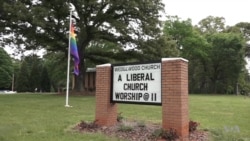Chris Ayers is no fire-breathing fundamentalist. But on this particular Sunday in late April, the soft-spoken pastor of Wedgewood Church in Charlotte, North Carolina, is unusually fired up, right from the start of his sermon.
"How stupid is HB-2," Ayers says from the pulpit in his welcoming church, emphasizing each of his words slowly and deliberately. "It is not only harmful and discriminatory, it is stupendously stupid."
Ayers is referring to a recently passed law in his state that restricts transgender people to using restrooms and other public facilities that match the gender on their birth certificates rather than the one they identify as.
Many churches in North Carolina support HB-2, saying it reflects their views on gender differences and is necessary to protect women and children from sexual predators.
But not Wedgewood. Over half its members are LGBT. Many are transgender people who say the law stigmatizes them as perverts.
"We are family-type people. We're regular working folks. We have good moral values," says Isley Whitfield, a 52-year-old transgender woman from Charlotte.
'Discrimination is a sin'
While LBGT-friendly churches are not uncommon, Wedgewood has made a particular effort to be welcoming. Its front doors are splashed in rainbow colors. A rainbow flag flies outside near a sign that reads, "Discrimination is a sin."
Inside, the traditional restroom signs with the outline of a man and woman lie shattered on a table in the foyer, a symbolic protest to HB-2. They've been replaced by rainbow signs that read "No discrimination."
"Anytime a LGBT person walks through the door of a church, it's really a miracle," says Pastor Ayers. "Because why would anybody try to have a relationship with God after being so rejected by the church in society?"
Support for HB-2
Across the state in Winston Salem, Pastor Ron Baity, who heads the Berean Baptist Church, is also focused on HB-2 and transgender issues.
"We feel like this is a good bill," says Baity, who has organized rallies in support of the law. "It's just common sense that women should use women's restrooms and men should use men's restrooms."
Baity does little to hide his contempt for transgender people. "I think that people who identify as transgender have some very serious problems," he says.
He is part of a conservative Christian movement that views the transgender debate as a defining moment in an effort to defend religious liberty and Biblical ideals.
Preserving Biblical gender distinction
Almost a year after the Supreme Court's historic ruling that legalized same sex marriage, the Christian right has seized on the transgender debate as an opportunity to fight back.
Some are pushing ahead with a coordinated initiative that aims to enshrine their values in laws at the state and local level.
Over the past year and a half, 27 states have introduced bills that would restrict transgender bathroom usage (So far, North Carolina is the only state to have passed such a bill).
But for many conservative Christian activists working behind the scenes to advance the legislation, the issue appears to go much deeper than bathroom usage - it's about preserving what they see as the Biblical concept of gender distinction.
"It's frankly absurd to assume that you can change your gender like you can change your clothes, simply because you want to be someone other than your birth sex," says Mathew Staver, the founder of the Liberty Counsel, an evangelical legal defense group.
A question of religious freedom
Staver acknowledges that the Liberty Counsel is one of the driving forces behind the transgender bathroom laws, as well as a wider effort aimed at passing legislation to protect the right of religiously minded people and businesses to deny services to any LGBT individuals.
The Liberty Counsel currently is working on draft legislation and providing other legal consultation in over 22 states, Staver says.
Close to 200 so-called "religious freedom" bills have been introduced by legislators across the country this year alone, according to Rose Saxe, a senior staff attorney at the American Civil Liberties Union.
"I think we're seeing a new sort of argument that basic respect for transgender people violates someone else's religious freedom," Saxe told VOA. "That's not been an argument we've seen until now."
Battle on
Only five states have passed anti-LGBT religious freedom laws so far, but the battle may only beginning.
Brandan Robertson, an author and evangelical activist who supports LGBT rights, predicts conservatives may have short-term success in passing discriminatory laws.
"From a policy perspective, it's a lot easier to propose laws than it is to combat laws," he says. "A lot of us are just now realizing that on the progressive side."
But long term, Robertson says conservative Christians appear to be in trouble, not least of all because opinion polls suggest increasing public support for LBGT rights.
Sensing that pressure, conservatives are spending an enormous amount of money to fight their legal battle on transgender issues, Robertson says.
"Because they know that once we get past this gender debate, then the LGBT rights conversation, in a very real way, is done," he says. "Because then we have L, G, B, and T having equal rights in society."
Ayers, the pastor at Wedgewood Church, is optimistic that his more conservative brothers will eventually come around on the issue, as well.
"I used to be a heterosexual, homophobic, ignorant person," he says." So if God can change me, there's hope, right?








